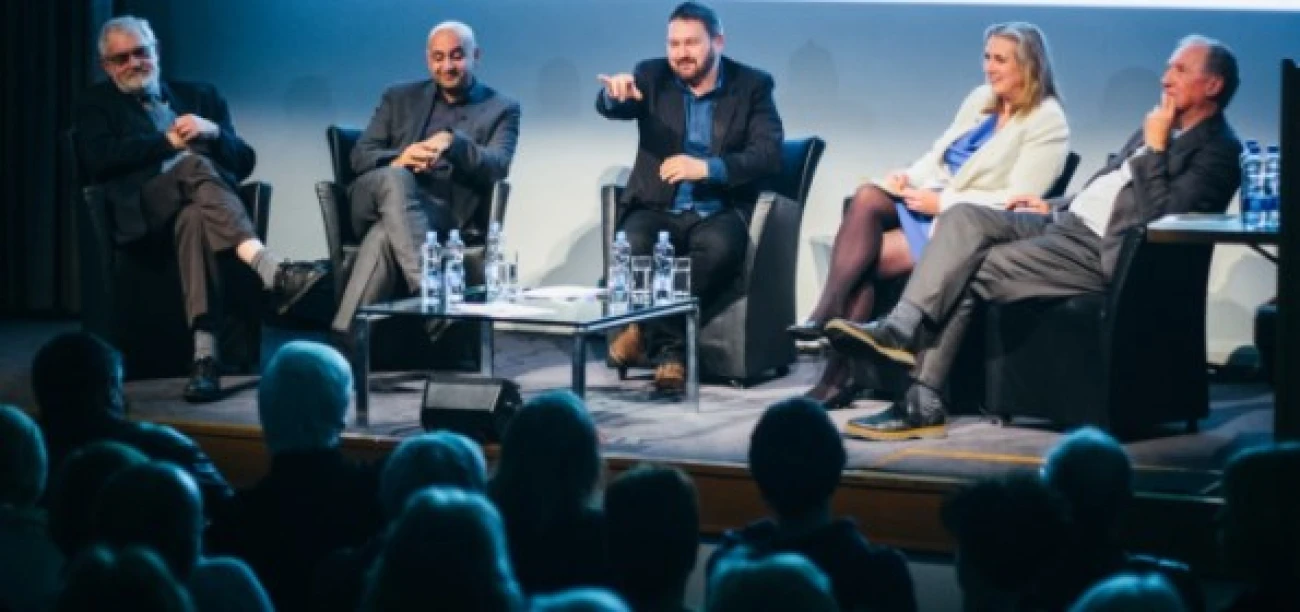BBC ‘Talking About Religion’ at 4 Corners event
The Ulster Museum was the backdrop for a heated and good–hearted conversation on the BBC’s religious broadcasting. Hosted by William Crawley, the panel consisted of Caroline Wyatt, the BBC’s Religious Affairs Correspondent, Roger Bolton, of BBC Radio 4’s Feedback programme, Bert Tosh, formerly Head of Religion with BBC Northern Ireland and Aaqil Ahmed, the BBC’s Head of Religion and Ethics.

Roger Bolton kicked off the debate by suggesting that it is impossible to understand who we are as a people without understanding our religious heritage. He made the case for an increase of religious literacy at the BBC (which was echoed by the other panellists during their output as well), suggesting that a failure to make this happen would give cause for fear of the company’s future.
Aaquil Ahmed talked about the changing landscape of Britain. “The status quo doesn’t exist” – and so the structure of the BBC must change. He highlighted the feedback of different religious groups as to what they would like from the BBC. Minority groups have emphasised the need to improve religious literacy, asking the BBC to help them help others understand their religion; whereas Christians have asked for more worship programmes.
Caroline Wyatt gave the audience a look into what life is like a “one point three person team” covering religion for the BBC. She talked about the challenge of covering religion well in a culture of news, which is about things that go wrong – religion “tends to be about the Pope, the Archbishop…and war.” The teaming of ethics and religion has been an interesting part of her job in terms of branding stories as one or both of the categories in order to get coverage.
Bert Tosh took a look back at BBC NI’s coverage of the Troubles, suggesting that the religious department perhaps came in to fill some gaps but was largely over–stretched with a member of staff dedicated to the post for only 7 months of the period. He too emphasised the importance of religious literacy, suggesting that we cannot expect a certain type of coverage from BBC staff who simply may not have the background to understand religion.
The floor was then open for questions from the audience, which varied greatly in topic and perspective. Why is ethics teamed with religion? Can you have politics without ethics? Is there a difference between ‘ethnic religion’ and ‘convictional religion’? How does the BBC know who its audience is, and what it wants? Where is the line drawn around what religious broadcasting should be? Is the BBC a ‘secular’ bubble? How can it better engage with young people who regurgitate their parents’ sound bites on religion?
During a period of change at the BBC, Roger Bolton implored the audience to lobby for “the promotion of religious literacy” to be included in the BBC’s public purposes. In keeping with this year’s theme, the art of listening, it was evident that in order to move forward progressively, the BBC needed to engage in active listening – as modelled, indeed, by the evening’s panel, which was in turn attentively listened to by the event’s audience. Not only should the BBC seek to listen in order to understand and reflect the local and global religious landscape effectively, it is no secret that it is also listened toby religious and non–religious spheres. Being listened to is a position of influence: we listen to what we hear. What will we hear from the BBC as it steps into its next chapter? As it seeks to improve its religious literacy in–house, can it improve ours? As it makes steps towards understand us better, will we in turn understand ourselves better, too?
Have your say here. Read Aaqil Ahmed’s piece on the duty of broadcasting to lead religious literacy here. And check out the rest of the 4 Corners Festival here.
With special thanks to Mark Adair at BBC NI for hosting this event.
Words by Gemma Brown (@gemmaruthbrown) | Photos by Adam Bartholomew (@ajbart)